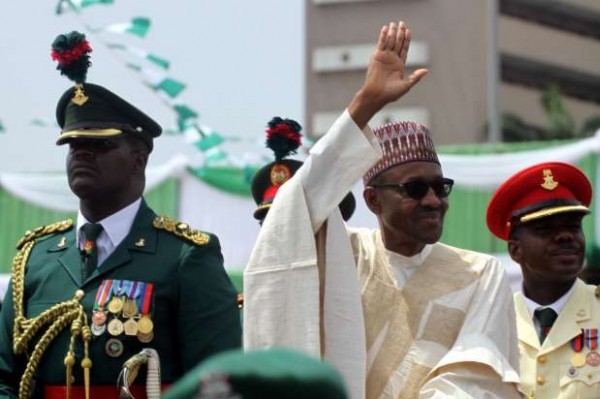I remember where I was when I heard President Buhari quote Shakespeare. I was sitting on the couch in my Chicago apartment listening to the inaugural speech via Channels TV’s live feed.
His accent is quite strong, so I had to listen really hard to make out what he was saying. That’s why when I heard the President say: “Our situation somehow reminds one of a passage in Shakespeare’s Julius Caesar,” I thought I was imagining things. Did the Nigerian President just have a literary moment? Or was I listening so hard that my ears had begun to play tricks on me?
Imagine my surprise and excitement. Who knew that the day would come when lines from a Renaissance play would make it into a political speech in Nigeria? Who knew?
I sat there stunned. Not because I cared much for Shakespeare and his plays. To be honest, Shakespeare was a teenage obsession. I read most of his plays all through my teenage years but then hated him all through my 20s. I’ve only recently come to be at peace with my grudging admiration for what I think is one of the most over-hyped body of work in history.
No, I wasn’t stunned because I thought Shakespeare was too cool for a Nigerian presidential speech. I was simply impressed at the idea that a Nigerian president would call on Nigerians to use literature to think about their historical moment.
As you can imagine, I rushed off to ransack my stash of Shakespeare’s work crammed inside a dust-encrusted box. A few weeks ago when we moved, I considered donating the box to a charity shop. Thank God I didn’t because after rereading Julius Caesar, I realized that Shakespeare’s 1599 political drama does have something to say about contemporary Nigerian politics.
Shakespeare’s Julius Caesar, it turns out, is an African story…a Nigerian story.
The renaissance classic mirrors modern African politics. Caesar’s assassination and the conspiracy leading up to it should remind us of the countless, often bloody, coup d’etats that became a staple of African politics in the 60s and 70s. Anyone who lived in Nigeria during Abacha’s regime would recall that we were essentially living inside a Julius Caesar stage play. All the assassinations, the beastly hunger for power, the violence, and greed. It was awful.
Teju Cole makes this point in his review of the 2013 “African” Julius Caesar performed in Brooklyn by an all-black cast and produced by the Royal Shakespeare Company.
“Caesar,” Cole points out, “is in the company of such manipulative despots as Idi Amin Dada, Mobutu Sese Seko, and Ibrahim Badamasi Babangida.” [read the review HERE]
Julius Caesar is meaningful for Africa based on the fact that it is a study in tyranny and failed political leadership.
But on May 29th, Shakespeare’s play made its way into President Buhari’s inauguration speech for an entirely different reason.
I can not recall when Nigeria enjoyed so much goodwill abroad as now. The messages I received from East and West, from powerful and small countries are indicative of international expectations on us. At home the newly elected government is basking in a reservoir of goodwill and high expectations. Nigeria therefore has a window of opportunity to fulfill our long – standing potential of pulling ourselves together and realizing our mission as a great nation.
Our situation somehow reminds one of a passage in Shakespeare’s Julius Caesar:
There is a tide in the affairs of men which,
taken at the flood, leads on to fortune;
Omitted, all the voyage of their life,
Is bound in shallows and miseries.We have an opportunity. Let us take it.
The quote is taken from Act 4, scene 3, lines 218–224. Brutus is telling Cassius why it would be a mistake to take a break from their military campaign against Mark Anthony and Flavius. Cassius is all for taking a pause at Sardis to regroup before continuing on with the fight. Brutus disagrees. The fight is not going to get any easier. As a matter of fact, the numbers of their enemy are increasing everyday while they seem to have peaked. They have one small window of opportunity. If they lose it, all hope might be lost. Their fate would be a downward spiral from there on.
For Buhari, this moment in Shakespeare’s classic reveals something about the contemporary Nigerian moment—if we don’t get it right this time, we are done for. There is something particularly auspicious about our present moment. The world is rooting for us. The forces of history are moving in our favor. Our time, it would seem, has finally come.
But then I’m wondering, what is so different this time around? After all, we’ve had many missed opportunities. In fact, the reason Africa is so far behind is because of all the many, many squandered opportunities. What is so special about this moment?









Is this forum where "culture" comes to die? - Page 4 April 24, 2016 09:17
[…] NFAI fest begins in Pune, to screen films adapted from Shakespearean plays | The Indian Express Why the Nigerian President Quoted Shakespeare | Brittle Paper The Bard Helps Thaw UK-Russia Relations Sign in or Register Now to […]